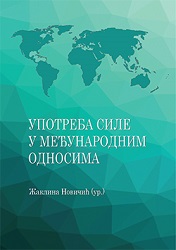РАЗВОЈ ВОЈНИХ НУКЛЕАРНИХ ПОТЕНЦИЈАЛА У ПОСТХЛАДНОРАТОВСКОМ ПОРЕТКУ КАО ИНСТРУМЕНТ ТВРДЕ МОЋИ У МЕЂУНАРОДНИМ ОДНОСИМА
DEVELOPMENT OF MILITARY NUCLEAR POTENTIAL IN THE POST-COLD WAR ORDER AS AN INSTRUMENT OF HARD POWER IN INTERNATIONAL RELATIONS
Author(s): Dušan N. Proroković
Subject(s): Politics / Political Sciences, Security and defense, Military policy, Geopolitics, Peace and Conflict Studies
Published by: Институт за међународну политику и привреду
Keywords: nuclear weapons; nuclear powers; nuclear optimists; nuclear pessimists; deterrence strategy; proliferation
Summary/Abstract: Despite numerous theses that the post-bipolar order will mark "the end of history" and that instruments of "soft power" will be more important for realizing the interests of the most important actors in world politics, following both the "horizontal" and "vertical" development of nuclear potentials of states, the conclusion is that little has changed in international relations. In an anarchic environment, states protect themselves by increasing the potential of hard power. Unlike the early 1990s when there were six nuclear powers in the world, there are now nine, and in addition to the three new ones, some old ones, such as China and Israel, have significantly modernized their nuclear potentials. The nuclear race continues, albeit under new conditions and with certain (legal) restrictions, but it is also a fact with more actors. The paper consists of four parts. The introductory part presents the development of nuclear potentials of states from World War II to the end of bipolarity. The second part is dedicated to explaining the views of realists (nuclear optimists) and idealists (nuclear pessimists) and the results of the actions of the latter. The third part analyzes events from the 1990s to the present day and examines the causes of the increase in the number of nuclear powers. The last part contains concluding remarks.
Book: Употреба силе у међународним односима
- Page Range: 91-120
- Page Count: 30
- Publication Year: 2018
- Language: Serbian
- Content File-PDF

